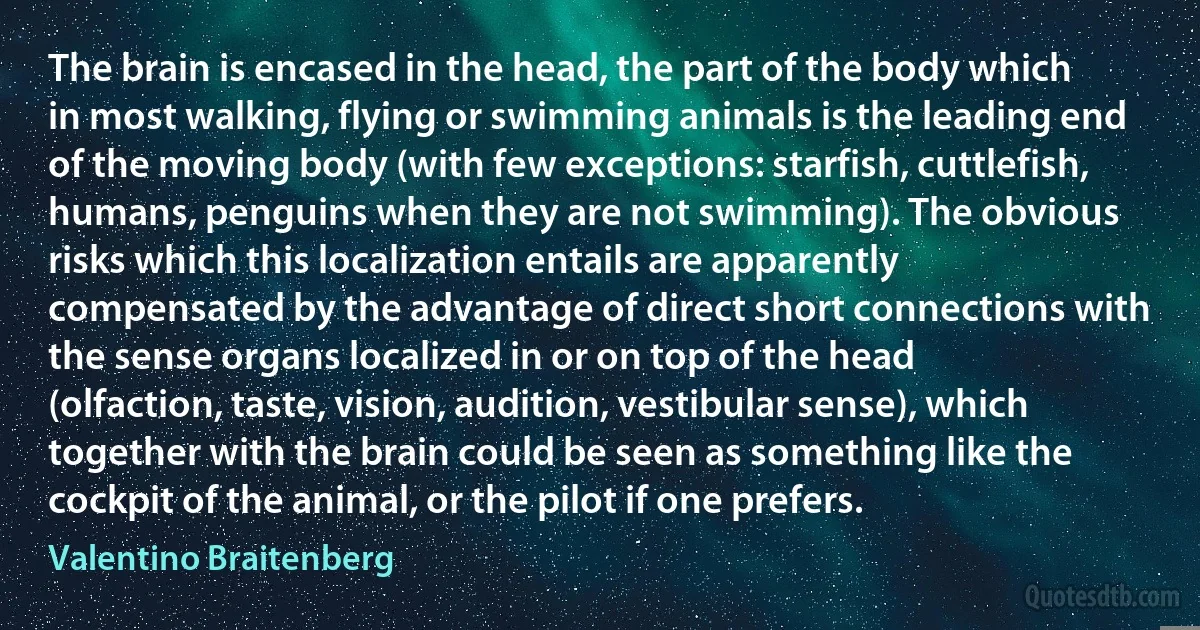
The brain is encased in the head, the part of the body which in most walking, flying or swimming animals is the leading end of the moving body (with few exceptions: starfish, cuttlefish, humans, penguins when they are not swimming). The obvious risks which this localization entails are apparently compensated by the advantage of direct short connections with the sense organs localized in or on top of the head (olfaction, taste, vision, audition, vestibular sense), which together with the brain could be seen as something like the cockpit of the animal, or the pilot if one prefers.
Valentino BraitenbergRelated topics
advantage animal audition body brain cockpit end few flying head moving seen sense short something taste top vision walkingRelated quotes
If... God highly exalted Christ because He humbled Himself, suffered dishonour, was tempted and endured a shameful cross and death for our sake, how will He save, glorify and raise us up if we neither choose humility, nor show love to our fellows, nor gain our souls by enduring temptation (cf. Lk. 21:19), nor follow the saving Guide through the 'strait gate' and along the 'narrow way' leading to eternal life (Mt. 7:14)? To this end we were called, says Peter, the chief Apostle, ' Because Christ also suffered for us, leaving us an example that we should follow His steps' (I Pet. 2:21).

Gregory Palamas
As dogs, cats, horses, and probably all the higher animals, even birds, as is stated on good authority, have vivid dreams, and this is shewn by their movements and voice, we must admit that they possess some power of imagination. ... Few persons any longer dispute that animals possess some power of reasoning. Animals may constantly be seen to pause, deliberate, and resolve. It is a significant fact, that the more the habits of any particular animal are studied by a naturalist, the more he attributes to reason and the less to unlearnt instincts.

Charles Darwin
But a kind of genius can come of this deprivation of sensation, of experience. It has been mistaken as naïve intelligence, when in fact it is empty intelligence, pure intelligence. The composition of the mind is altered. Its previous cultivation is disintegrated and it has greater access to the brain, the body: it is Supersanity. Learning is turned inside out. You have to start from the top and work your way down. You must study mathematical theory before simple arithmetic; theoretical physics before applied physics; anatomy, you might say, before you can walk.

Jack Abbott
Idea or Vision, in its sensuous meaning, would be something that could be perceived only by the bodily eye and not by any other sense such as taste, hearing, etc.; it would be such a thing as a rainbow, or the forms which pass before us in dreams. Idea or Vision, in its supersensuous meaning, would denote, first of all, in conformity with the sphere in which the word is to be valid, something that cannot be perceived by the body at all, but only by the mind; and then, something that cannot, as many other things can, be perceived by the dim feeling of the mind, but only by the eye of the mind, by clear perception.

Johann Gottlieb Fichte
As long as we try to project from the relative and conditioned to the absolute and unconditioned, we shall keep the pendulum swinging between dogmatism and skepticism. The only way to stop this increasingly tiresome pendulum swing is to change our conception of what philosophy is good for. But that is not something which will be accomplished by a few neat arguments. It will be accomplished, if it ever is, by a long, slow process of cultural change – that is to say, of change in common sense, changes in the intuitions available for being pumped up by philosophical arguments.

Richard Rorty
